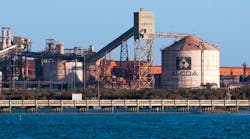With 6 million jobs lost in the last decade, U.S. manufacturing bore the brunt of globalization and recession, not to mention a widespread belief that its day had simply passed. But panelists at a Brookings Institution conference said there are good reasons to expect a resurgence of U.S. manufacturing if it is supported by smart public policies and public-private programs.
"We still think about manufacturing in the U.S. as yesterday's economy as opposed to the vanguard of innovation in our economy," said Bruce Katz, a vice president at the Brookings Institution. But he points out, manufacturing accounts for "9% of jobs, 11% of GDP, 35% of engineers, 68% of private R&D, and 90% of our patents. We may be the only economy to decouple production and innovation."
See Also: Manufacturing Innovation & Product Development Strategy
At the Brookings event, titled "Fostering Growth Through Innovation," Katz noted that a series of developments -- rising wages in China, shale gas, the beginning of reshoring and disruptive technologies such as 3D printing -- offer the promise that U.S. manufacturing is at the "beginning of something big."
Klaus Kleinfeld, chairman and CEO of Alcoa (IW 500/48), cited as evidence the surprising resurgence of the automotive industry, with projections that production levels will reach pre-recession levels this year. He said CAFE standards played an important role in promoting innovation as manufacturers looked for ways to make vehicles lighter. Kleinfeld said discoveries of shale oil and gas are "gifts" to the U.S. economy that are so big and have "so many implications that we are just starting to understand what that means."
As a result of these developments, he noted, Alcoa is investing $300 million to expand its Davenport, Iowa rolled products plant to meet automotive needs. It has also stepped up production at its Point Comfort, Texas refinery, which was once a "swing" facility but is now one of the lowest cost refineries in Alcoa’s network because of reduced energy costs.
Promoting the Manufacturing Workforce
In order to capitalize on the positive developments already occurring in manufacturing, panelists at the Brookings conference said manufacturing and policy leaders must tackle some major challenges. Alcoa’s Kleinfeld noted that 2.7 million manufacturing workers are expected to retire between now and 2018. Moreover, he said, estimates are that 40% of manufacturing jobs will require a post-secondary education as manufacturing becomes more technically sophisticated.
Greg Fischer, a former manufacturing CEO and now mayor of Louisville, Ky., told the conference that when GE (IW 500/5) was hiring for its appliance factory in Louisville, it needed 1,000 employees. Some 12,000 applied for jobs, Fischer said, but only a quarter of them were qualified. He said the U.S. needs to not only promote technical skills but also soft skills such as the ability to work in teams.
Fischer echoed other speakers that a cultural change needs to take place in the United States so that manufacturing jobs are valued and young people see them as desirable career paths. As an example, he pointed to industrial maintenance technicians as one of the "rock star" positions in manufacturing, with incomes reaching $80,000 to $100,000. While they are "absolutely necessary" to keep factories running, Fischer said, their ranks have been diminished by 10 to 15 years of outsourcing and an aging workforce.
Emily DeRocco, former president of The Manufacturing Institute, said experts do know what works to create a skilled workforce, but solutions have not been implemented on a national basis. She said efforts should be focused on regional economies where manufacturing clusters are developing. DeRocco said the U.S. should end the "false dichotomy" that federal policies have created between educational pathways and workforce development. Integrated programs have been developed that take students from secondary education to post-secondary programs, she said, and provide them with the skills needed for 60% of the jobs not necessarily requiring a baccalaureate or graduate degree. Portable manufacturing skills certification programs, principally the NAM-endorsed skills certification system, have been integrated into the education system in some areas. These programs provide students with the basic skills needed to move into entry-level manufacturing jobs.
Panelists agreed that manufacturing is hampered by the fact the public simply doesn’t understand the sector. The widespread view of dirty, low-tech factories doesn’t reflect the reality in many manufacturing workplaces which are quiet, clean and feature advanced technology. As a result, parents and educators don’t encourage young people to look at manufacturing as a career path.
DeRocco said much better information was needed about the "jobs, occupations and skills in manufacturing today." She said BLS data does not properly define current manufacturing jobs, with the result that some advanced manufacturing jobs are left out of databases or misclassified as service jobs.
One problem, said Dominic Barton, global managing director for McKinsey & Co., is that all manufacturing is lumped into one category. He said advanced manufacturing has prospered before and after the recession and draws on "many of the innovation capabilities this country is good at." He noted that the collaborative environments that foster new businesses and innovative technologies in places such as Silicon Valley; Austin, Texas; and Cambridge, Mass., have proved difficult to emulate in other countries.
"We need to take the competitive advantage we have around collaboration and scale it," he said.
Manufacturing: Key to the 'Next Economy'
The Brookings meeting coincided with a series of proposals released by the think tank to promote manufacturing in the United States. Brookings put manufacturing at the forefront of creating a "next economy," one that "exports more and wastes less, innovates in what matters, produces more of what it invents and ensures that the economy actually works for working families."
One idea put forward is to create 20 "U.S. Manufacturing Universities" similar to to the land-grant colleges created by the Morrill Act in 1862. Each university would receive at least $25 million annually from the National Science Foundation plus preferred consideration for NSF grants.
These schools would be required to revamp their engineering programs so they put more emphasis on manufacturing engineering. The schools would stress joint university-industry research projects, cooperative education experiences and Ph.D. programs designed to produce more engineers who will work in industry.
"These universities would view doctoral training as akin to high-level apprenticeships (as is often the case in Germany) and would not allow the conferral of a Ph.D. unless one has done some work in industry," explained Robert D. Atkinson and Stephen Ezell in a paper describing the program.
A nationwide network of advanced industries innovation hubs was also proposed to accelerate innovation and strengthen U.S. competitiveness in industries such as aerospace, automotive assembly, advanced energy systems, information technology and medical devices. Brookings pointed out that these advanced industries "comprise over 10% of the overall economy, generate 45% of U.S. goods exports and support over 4 million high-skilled, and several million more ancillary, jobs."
Brookings said private companies may not adequately support innovation because the risks are considered too high or the commercial benefits are undetermined. It proposed that the federal government build out the Department of Energy's Energy Innovation Hubs and fund at least 20 hubs under the Commerce Department’s National Network for Manufacturing Innovation initiative.
Brookings recommended that to ensure their commercial relevance, these regional applied research centers must have strong private sector participation and funding would be contingent on investment from businesses and other non-federal organizations. It suggested that the hubs could focus on issues such as carbon capture and storage, solar photovoltaics, smart grid, nanomanufacturing and industrial robotics.
Another proposal was to create a "Race to the Shop" competition to support workforce education and skills training for advanced manufacturing. The competition would call on leaders from the public and private sector to develop plans for strengthening advanced manufacturing in their states or metropolitan areas and then propose projects and investments to carry out the plan. The involvement of local manufacturing companies would be required and performance measures would be created to gauge progress on the plan.





